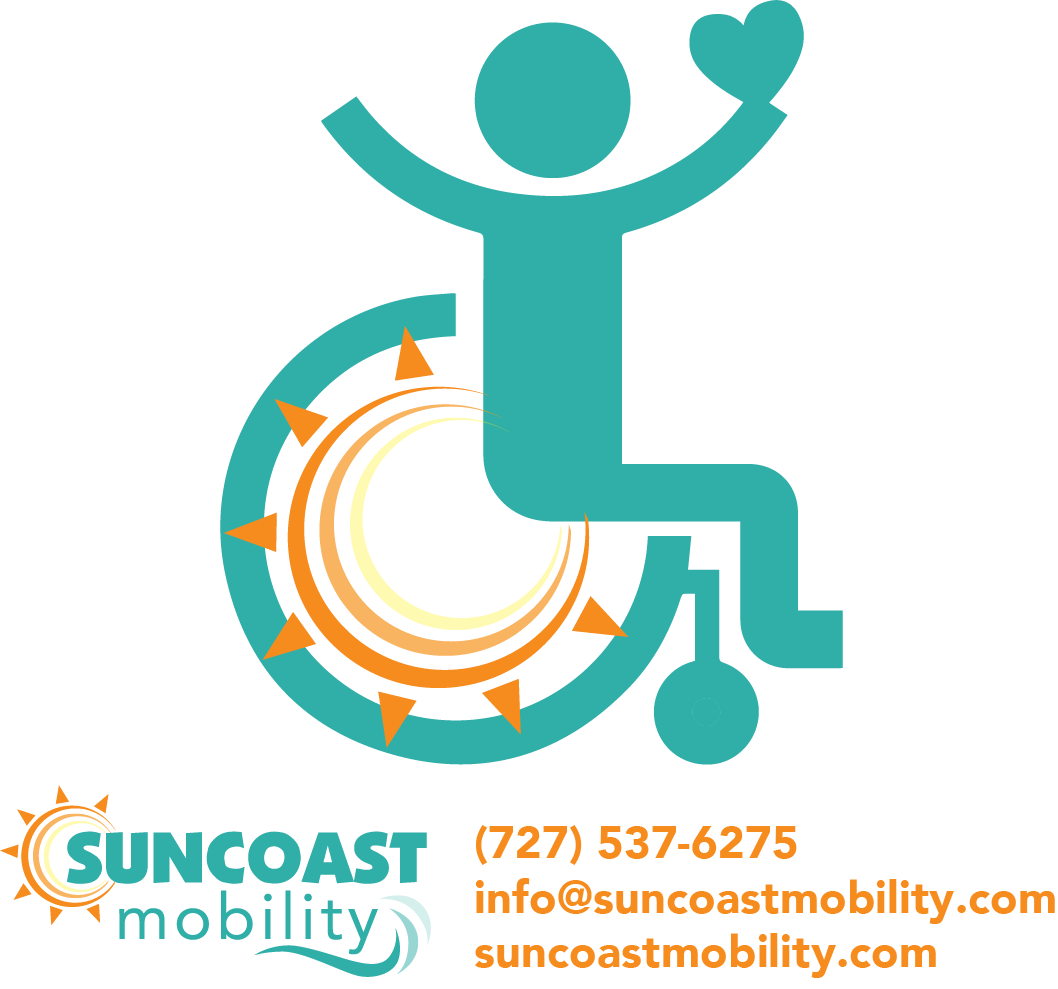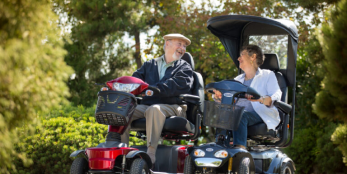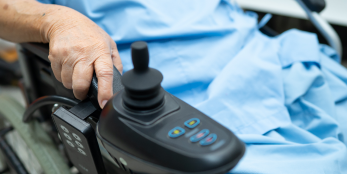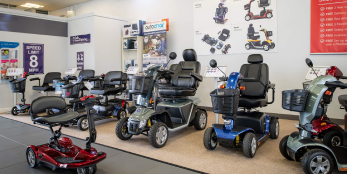Table of contents
Traveling with a Mobility Scooter on Allegiant Airlines
Allegiant Airlines welcomes mobility scooters and other assistive devices, can be checked at no additional charge. However, due to FAA regulations, battery-powered wheelchairs and scooters are not permitted in the cabin and must be checked at the ticket counter or gate before departure.
What You Need to Know:
Checked Baggage: Mobility scooters are transported in the aircraft’s cargo hold.
Cabin Restrictions: Battery-powered scooters and wheelchairs are not allowed in the cabin.
FAA Compliance: All mobility devices must meet FAA safety requirements for air transport.
Gate Check Option: You may check your scooter at the gate for added convenience.
Weight Consideration: If your mobility device weighs over 200 lbs, notify Allegiant in advance at ACAA@allegiantair.com.
Battery Guidelines:
-
Spillable (Wet Cell) Batteries: Must be securely attached in protective housing. Battery cables must be disconnected. If your device cannot be stored upright, the battery may need to be removed and placed in a protective battery box.
-
Non-Spillable (Dry Cell) Batteries: Must also be housed securely for safe handling and transport.
Preparation Tips:
Arrive Early: Be at the gate at least one hour before departure—especially if you require an aisle chair.
Label Your Device: Include your name and contact information directly on your mobility device.
Detach Fragile Components: Remove any detachable parts (such as baskets or cushions) and bring them onboard as carry-on items.
Provide Instructions: Share handling and stowing instructions with Allegiant staff to ensure proper care of your device.

Manual wheelchairs that are foldable, collapsible, or break down can be carried in the aircraft cabin. Allegiant can accommodate up to two (2) wheelchairs per flight in the cabin, but only one (1) is allowed on a first-come, first-served basis if the flight is full.
To qualify for in-cabin storage, your wheelchair must not exceed:
13” (W) x 36” (H) x 42” (L)
This is measured without removing or disassembling the wheels.
Optional but Recommended:
-
Contact Allegiant's Disability Team: For questions or to provide advance notice about your device, email ACAA@allegiantair.com.
About the Process of Boarding with a Battery Operated Device
Battery-powered mobility devices (wheelchairs/scooters, etc.) will be checked at no additional charge at the gate or ticket counter. Assistive devices must be stowed in compliance with FAA safety regulations. Note that battery-operated wheelchairs and scooters cannot be stowed in the cabin per FAA safety regulations. If any assistive device is unable to comply with FAA regulations, it may be denied for transport.
All fragile and detachable parts (i.e. cushions, arm or leg rests, and side guards) should be removed and stowed within the cabin in an overhead bin.
In some situations, it will be necessary to remove the battery from the wheelchair or mobility device and to package it separately to comply with FAA safety regulations. Refer to the Mobility Aids section of our Restricted Articles list for additional information regarding battery restrictions.
If you have any questions regarding your specific device, email Allegiant’s Disabilities Team at ACAA@allegiantair.com with detailed information.
Other Assistive Devices
Other assistive devices, such as canes, crutches, CPAP machines, etc. that can be stowed in the aircraft cabin compliant with FAA safety regulations, will not be counted toward your one carry-on plus one personal item limit. If an assistive device cannot be stored safely in the cabin, we will tag your device and safely transport it in the cargo compartment. If any assistive device is unable to comply with FAA regulations, it may be denied for transport.
Does Allegiant offer mobility assistance to passengers at the airport?
Allegiant provides several levels of mobility assistance for passengers:
Gate to Gate: For passengers who can walk from the gate to their seat on board.
Aircraft Entry to Seat: For those able to walk from the aircraft door to their seat.
Non-Ambulatory: For passengers who need an aisle chair and transfer assistance to reach their seat.
Please select the highest level of assistance needed, as boarding conditions may vary between airports (e.g., jet bridge vs. outdoor ramp).
To request assistance:
Add a Special Service Request (SSR) when booking your flight or update your existing reservation through Manage Travel.
For additional help or questions, submit a Customer Request for Assistance Form, selecting “Disability & Wheelchair Assistance” as the topic. If traveling within 48 hours, please call Allegiant Customer Care at (702) 505-8888.
Traveling with a Portable Oxygen Concentrator (POC)
When you arrive at the airport, please inform an Allegiant representative at the ticket counter or gate that you're traveling with a POC. The device will be inspected for:
-
FAA Approval: The unit must have an FAA-compliant label or appear on the official FAA-approved list.
-
Battery Life: Your POC must have sufficient battery power for the duration of the flight plus an additional 50% (e.g., a 2-hour flight requires 3 hours of battery life).
-
Extra Batteries: You may carry extra batteries in your carry-on to meet the battery life requirement.
While pre-boarding is not mandatory, it is highly recommended so you have enough time to safely stow your device. Please note: You may be required to sit in a window seat to comply with federal safety regulations.
Transporting Medical and Assistive Devices
There is no charge to travel with required medical or assistive devices. Mobility aids such as wheelchairs and scooters are transported free of charge and may be checked at the Allegiant ticket counter or at the gate prior to departure.
All assistive devices stowed in the cargo area must comply with FAA safety regulations. Battery-operated wheelchairs and scooters are not permitted in the cabin. Devices that do not meet FAA requirements may be denied for transport. Please review the following guidelines to ensure your device is eligible for safe transport.
For information on restricted items, refer to the Mobility Aids section in our Restricted Articles List.


Passenger Preparation Checklist
We strongly recommend the following:
Arrive at the gate at least one (1) hour before departure, especially if an aisle wheelchair is needed.
Label your wheelchair with your name and contact information.
Remove all detachable or fragile parts (e.g., joystick, footrests, leg guards) and bring them into the cabin to store in the overhead bin.
Provide handling and stowage instructions to an Allegiant representative.
If your mobility device weighs more than 200 lbs., please email us in advance at ACAA@allegiantair.com.
Battery-Operated Wheelchairs & Scooters
All batteries must be evaluated by an Allegiant representative before acceptance. The battery and device must:
-
Be easily accessible for inspection
-
Clearly display battery specifications in English
-
Show no signs of defect or damage
-
Have an effective method to prevent accidental activation, such as a key switch, on/off button, or kill switch (must be used)
Devices that do not meet these criteria will not be accepted. If you have questions about your specific device, contact our Disabilities Team at ACAA@allegiantair.com.
Battery Type Requirements
Lithium-Ion Batteries
-
Built-in, enclosed, and protected batteries (integrated into the device):
-
No watt-hour (Wh) limits; may remain installed and transported in the cargo hold.
-
-
Removable or exposed batteries (e.g., on collapsible devices):
-
Must be removed and carried in the cabin.
-
Must not exceed 300 Wh.
-
You may bring one (1) spare battery up to 300 Wh or two (2) spare batteries up to 100 Wh each in your carry-on.
-
Lithium Metal (Non-Rechargeable) Batteries
Not permitted for transport.
Spillable (Wet Cell) Batteries
Must be securely installed in a protective housing.
Cables must be disconnected and terminals insulated.
If the device cannot be stowed upright, the battery must be removed and stored in a battery box in the cargo hold by Allegiant staff.
Non-Spillable (Dry Cell) Batteries
Must be securely housed and attached to the device.
If upright storage isn't possible, terminals will be protected to prevent short-circuiting and the battery will be stored upright.
Can a passenger with a disability board the aircraft early?
Allegiant offers pre-boarding for passengers with disabilities and those who may need extra time to board. To take advantage of this service, we recommend arriving at the gate at least one hour prior to your scheduled departure.
How do I check in at the airport if I am traveling with an FAA approved respiratory device (POC) or medical device?
To request mobility or oxygen-related accommodations, please submit a Special Service Request (SSR) when booking your flight or update your reservation through Manage Travel. For additional support, complete a Customer Request for Assistance Form and select “Disability & Wheelchair Assistance” from the “Nature of Your Request” dropdown.
How do I get mobility assistance at the airport?
If your travel is within the next 48 hours , we recommend contacting Allegiant Customer Care at (702) 505-8888 for prompt assistance.
How do I report a lost or damaged wheelchair, scooter, or other mobility device?
If your personal mobility device was damaged or mishandled during transport, please report it immediately to an Allegiant representative at the airport. They will file a claim on your behalf with our partner, Global Repair Group. Should you require a temporary replacement device, Global Repair Group will arrange one for you.
If you discover the damage after leaving the airport, please contact us as soon as possible. All damage claims must be submitted within 72 hours of your flight’s arrival.
To report damage or request assistance, you can email Allegiant at Assistive.Devices@allegiantair.com or call Allegiant Customer Care at (702) 505-8888 and ask to speak with a Complaint Resolution Official (CRO) . CROs are available 24/7, and you have the right to speak with one at any time.
I use a wheelchair/scooter. Will I have to pay to bring it with me?
No, there is no fee to travel with necessary medical or assistive devices. Mobility aids, including wheelchairs and scooters, are transported at no cost and may be checked either at the Allegiant ticket counter or at the gate prior to departure.
Traveling with a Mobility Scooter on Allegiant Airlines – Summary
Allegiant Airlines allows passengers to travel with mobility scooters and assistive devices free of charge , provided they meet FAA safety regulations . Battery-operated devices must be checked at the gate or ticket counter and are not allowed in the cabin.
✅ Key Guidelines:
Mobility scooters/wheelchairs are stowed in the cargo hold and must comply with FAA rules.
Gate check is available for added convenience.
If your device weighs over 200 lbs, notify Allegiant in advance at ACAA@allegiantair.com.
No charge for medical or assistive devices, and they don’t count toward your carry-on limit.
🔋 Battery Requirements:
Lithium-ion batteries: Must not exceed 300 Wh. Removable batteries must be carried on board.
Lithium metal (non-rechargeable): Not allowed.
Spillable (wet cell): Must be securely housed; terminals insulated; may require removal if device can't stay upright.
Non-spillable (dry cell): Must be secured and may require terminal protection.
🧳 Preparation Tips:
Arrive at the gate at least 1 hour early , especially if you need an aisle wheelchair.
Label your device with contact info.
Remove fragile/detachable parts and bring them into the cabin.
Provide staff with stowage instructions for your device.
🧑🦼 Manual Wheelchairs:
Collapsible manual chairs may be brought in the cabin, depending on space and dimensions (must not exceed 13" x 36" x 42").
🛫 Mobility Assistance Services:
Allegiant offers assistance ranging from gate-to-gate help to aisle chair transfers . Request this during booking or by contacting customer care.
💨 Traveling with Portable Oxygen Concentrators (POCs):
Devices must be FAA-approved and have sufficient battery life for the flight plus 50%.
Extra batteries are allowed in carry-on baggage.
Pre-boarding is recommended for passengers using POCs.








